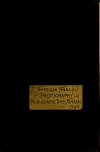The origin of “much of the best work” is “done by amateurs” dates back to 1890 in photography. At that time, glass photographic plates was the norm for large images, as compared to the Kodak box camera released in 1888 with flexible roll film returned to the company for processing and reloading.
Thoroughness
Much of the best work one sees is done by so-called amateurs. In fact, good work can only be done by amateurs in the true sense; i.e., those who love their work, and the secret is thoroughness. One must be thoroughly interested in the work—make a thorough study of the subject, and have nerve enough to keep the holder out of the camera unless the light is satisfactory and the composition thoroughly good. The “you press the button and we do the work” method is often effective, but for plates of any size more often a waste than a gain.
Very frequently we see picture makers who carefully read and observe the instructions sent by the makers with each box of plates, and the result is favorable. I envy them their pictures and the ability to stick to instructions, but I can’t do it myself. I confess to having little interest in a picture after the first batch of prints, or even after the negative has shown its quality—for the chemistry and other details of the subject exhaust most of my zeal.
It has been my pleasure to incite some hundreds of persons to try the various branches of photography, pure and simple, while I have done some work in every branch from wet-plate to photo-engraving, and the criticisms here made apply equally to myself.
I am a “hit or miss” portraitist, but am dead sure on some other branches said to be more difficult.
Most people fail in their efforts in some direction, as is quite natural. Those who stick to one class of photographs usually make a success.
I like to watch others work, and my experience is that failures are due to lack of thoroughness at some stage. [….]
J.W. MacMurray
Source: MacMurray, J.W. 1890. “Thoroughness.” In The American Annual of Photography, edited by C.W. Canfield, 4:38–40. New York, NY, USA: The Scovill & Adams Company. https://archive.org/stream/americanannualof04newy#page/n83/mode/2up.
The 1890 author is fully identified as Major J.W. MacMurray, USA in the table of contents [p. v]. It is likely the same Major J.W. McMurray who was appointed as a Military Professor at the University of Missouri in 1872. The interest in photography might be associated with drawing in engineering in the U.S. Army at that time.
Military Science.
The instructions in Military Science, and the drill of the soldiers, which had been suspended in consequence of the retirement from service of the later professor, will be resumed under favorable circumstances, Major J. W. McMurray, of the First Regiment of Artillery, having been detailed by the President as Military Professor in the University.
Major McMurray reported himself for duty on the 21st of March. He will also take charge of a class in practical engineering. Indeed, a class in topographic and field surveying, with the use of instruments, is now under his instruction. [p. 20]
The Campus.
Major McMurray has undertaken a work which has been too long neglected — the improvement and beautifying of the University Campus. The survey of this ground, so admirably adapted in its natural surface to the highest art in the production of scenery, the laying off of walks, the adjustment of curves, the calculation of topography, the construction of an artificial lake, and other arrangements, have afforded valuable practical exercises for his class.
The improvement, which is now in progress, will cost not less than $1,200; and it is believed, will produce an excellent influence upon the moral and aesthetic culture of the students.
We cannot pass by this more desirable work, which already promises so much towards presenting to the eye a lovely and picturesque landscape, without recording it as one of the notable events in the history of the year’s progress.
Drawing.
A class in Drawing was organized for the second semester, under the instruction of Prof. Abert, the Professor of English Literature. The long experiences of Prof. Abert, as an Engineer in the U.S. Army, and his particular taste and artistic culture, eminently qualify him to give instruction of the highest order in this important art — elegant as an accomplishment, and indispensable to the engineer, the architect, and in all the applications of science to the pursuits of life. The class instruction has been highly successful, and many of the specimens retained in the drawing room exhibit extraordinary proficiency on the part of the students. [p. 21]
Source: University of Missouri. 1872. General Catalog at http://books.google.ca/books?id=SvNEAQAAMAAJ
The Missouri School of Mines and Metallurgy opened in 1871 is now The Missouri University of Science and Technology.



